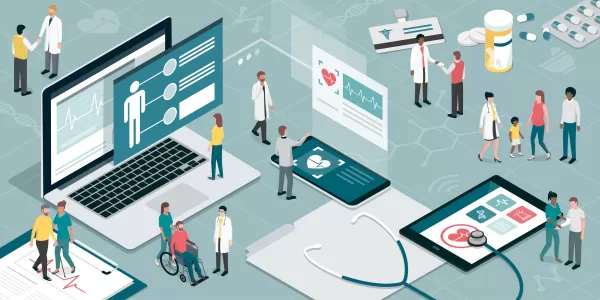35% of college students are using AI tools to help them with their studies

The global upheaval caused by the COVID-19 pandemic has left an indelible mark on students, pushing them towards uncharted territories of online learning amidst persistent disruptions. This shift has inevitably led to what's known as "pandemic learning loss." In their quest to reclaim lost ground, students are increasingly leaning on innovative solutions like generative AI.
A recent McGraw Hill survey, facilitated by Morning Consult, delved deep into the evolving landscape of higher education. The study polled 500 undergraduate students and 200 college instructors, shedding light on emerging trends in student habits, mental health, and more.
It turns out that a significant chunk of students—one in five, to be precise—have felt the academic pinch due to learning loss triggered by the pandemic. Meanwhile, a striking 34% of instructors believe that virtually all or most of their students have faced similar struggles.
In an effort to mitigate these challenges and close the learning gap, students are increasingly turning to a variety of online tools and social media platforms. As Simon Allen, the CEO of McGraw Hill, points out, "Despite the many challenges students and educators face, including COVID-related learning disruptions and the growing mental health crisis on college campuses, the learning technologies we're building today can help support students on their unique paths to success in the future."
Students Embrace AI and Social Media for Learning
The survey revealed that a whopping four out of five students have utilized social media or ChatGPT to bolster their studies and access class-related content. In the past year alone, 35% of students have turned to ChatGPT or other AI chatbots to assist with their schoolwork.
Despite the potential pitfalls of using generative AI—such as concerns over cheating, misinformation, and accuracy—the general sentiment towards these tools remains overwhelmingly positive. Both students and instructors are looking at the long-term benefits, with 62% of students and 58% of instructors believing that AI will ultimately enhance learning more than it will pose negative consequences.
Trust in AI Tools
Moreover, the survey found that AI tools, particularly those utilizing content developed and vetted by reputable academic sources, could significantly boost confidence and comfort levels among both students and instructors. Specifically, 39% of students and 46% of instructors expressed greater ease with AI tools when the content is from trusted academic sources.
As we navigate these challenging times, it's clear that while the pandemic has introduced significant hurdles, it has also spurred a wave of innovation in education. Students and educators alike are finding new ways to adapt and thrive, with AI playing a pivotal role in this transformation.
Related article
 Google's Gemini app adds real-time AI video, Deep Research, and new features (120 chars)
Google unveiled significant Gemini AI enhancements during its I/O 2025 developer conference, expanding multimodal capabilities, introducing next-generation AI models, and strengthening ecosystem integrations across its product portfolio.Key Gemini Li
Google's Gemini app adds real-time AI video, Deep Research, and new features (120 chars)
Google unveiled significant Gemini AI enhancements during its I/O 2025 developer conference, expanding multimodal capabilities, introducing next-generation AI models, and strengthening ecosystem integrations across its product portfolio.Key Gemini Li
 Assort Health Secures $50M Funding to Automate Patient Communication
Assort Health, an emerging AI healthcare startup specializing in automated patient communications for specialty practices, has secured approximately $50 million in Series B funding at a $750 million valuation, according to sources familiar with the t
Assort Health Secures $50M Funding to Automate Patient Communication
Assort Health, an emerging AI healthcare startup specializing in automated patient communications for specialty practices, has secured approximately $50 million in Series B funding at a $750 million valuation, according to sources familiar with the t
 Generate Excel Formulas Instantly with AI-Powered Excel Tool
Transform your spreadsheet workflow with GPTExcel - the AI-powered solution that converts natural language descriptions into precise Excel and Google Sheets formulas. This powerful tool eliminates the frustration of manual formula creation, making co
Comments (1)
0/200
Generate Excel Formulas Instantly with AI-Powered Excel Tool
Transform your spreadsheet workflow with GPTExcel - the AI-powered solution that converts natural language descriptions into precise Excel and Google Sheets formulas. This powerful tool eliminates the frustration of manual formula creation, making co
Comments (1)
0/200
![RaymondAdams]() RaymondAdams
RaymondAdams
 August 27, 2025 at 10:32:46 PM EDT
August 27, 2025 at 10:32:46 PM EDT
It's wild that 35% of students are using AI for school! I guess it’s like having a super-smart study buddy who never sleeps. But, makes me wonder if we’re losing the knack for good ol’ critical thinking. 🧠


 0
0

The global upheaval caused by the COVID-19 pandemic has left an indelible mark on students, pushing them towards uncharted territories of online learning amidst persistent disruptions. This shift has inevitably led to what's known as "pandemic learning loss." In their quest to reclaim lost ground, students are increasingly leaning on innovative solutions like generative AI.
A recent McGraw Hill survey, facilitated by Morning Consult, delved deep into the evolving landscape of higher education. The study polled 500 undergraduate students and 200 college instructors, shedding light on emerging trends in student habits, mental health, and more.
It turns out that a significant chunk of students—one in five, to be precise—have felt the academic pinch due to learning loss triggered by the pandemic. Meanwhile, a striking 34% of instructors believe that virtually all or most of their students have faced similar struggles.
In an effort to mitigate these challenges and close the learning gap, students are increasingly turning to a variety of online tools and social media platforms. As Simon Allen, the CEO of McGraw Hill, points out, "Despite the many challenges students and educators face, including COVID-related learning disruptions and the growing mental health crisis on college campuses, the learning technologies we're building today can help support students on their unique paths to success in the future."
Students Embrace AI and Social Media for Learning
The survey revealed that a whopping four out of five students have utilized social media or ChatGPT to bolster their studies and access class-related content. In the past year alone, 35% of students have turned to ChatGPT or other AI chatbots to assist with their schoolwork.
Despite the potential pitfalls of using generative AI—such as concerns over cheating, misinformation, and accuracy—the general sentiment towards these tools remains overwhelmingly positive. Both students and instructors are looking at the long-term benefits, with 62% of students and 58% of instructors believing that AI will ultimately enhance learning more than it will pose negative consequences.
Trust in AI Tools
Moreover, the survey found that AI tools, particularly those utilizing content developed and vetted by reputable academic sources, could significantly boost confidence and comfort levels among both students and instructors. Specifically, 39% of students and 46% of instructors expressed greater ease with AI tools when the content is from trusted academic sources.
As we navigate these challenging times, it's clear that while the pandemic has introduced significant hurdles, it has also spurred a wave of innovation in education. Students and educators alike are finding new ways to adapt and thrive, with AI playing a pivotal role in this transformation.
 Assort Health Secures $50M Funding to Automate Patient Communication
Assort Health, an emerging AI healthcare startup specializing in automated patient communications for specialty practices, has secured approximately $50 million in Series B funding at a $750 million valuation, according to sources familiar with the t
Assort Health Secures $50M Funding to Automate Patient Communication
Assort Health, an emerging AI healthcare startup specializing in automated patient communications for specialty practices, has secured approximately $50 million in Series B funding at a $750 million valuation, according to sources familiar with the t
 Generate Excel Formulas Instantly with AI-Powered Excel Tool
Transform your spreadsheet workflow with GPTExcel - the AI-powered solution that converts natural language descriptions into precise Excel and Google Sheets formulas. This powerful tool eliminates the frustration of manual formula creation, making co
Generate Excel Formulas Instantly with AI-Powered Excel Tool
Transform your spreadsheet workflow with GPTExcel - the AI-powered solution that converts natural language descriptions into precise Excel and Google Sheets formulas. This powerful tool eliminates the frustration of manual formula creation, making co
 August 27, 2025 at 10:32:46 PM EDT
August 27, 2025 at 10:32:46 PM EDT
It's wild that 35% of students are using AI for school! I guess it’s like having a super-smart study buddy who never sleeps. But, makes me wonder if we’re losing the knack for good ol’ critical thinking. 🧠


 0
0





























